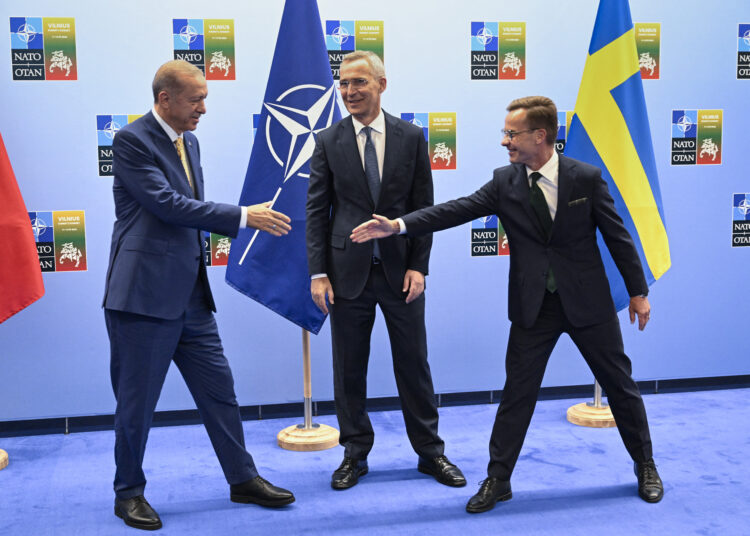Levent Kenez/Stockholm
Turkish President Recep Tayyip Erdogan, in a statement following his one-day visit to Hungary on Sunday, said the passage of Sweden’s NATO accession protocols in parliament is uncertain in terms of timing and is subject to committee and plenary approval.
Erdoğan’s statement claiming uncertainty about the duration of Sweden’s approval process in parliament doesn’t necessarily reflect the situation. The quick approval of Finland’s NATO application earlier this year occurred quite swiftly due to Erdogan’s party and its allies having the majority in parliament. The transformation of a proposal into law in as little as 15 days is a rare occurrence in Turkish parliamentary proceedings.
Erdogan submitted Finland’s application proposal to parliament for approval on March 17, and the Office of the Speaker referred it to the Foreign Affairs Committee three days later. The committee, which convened immediately, approved the proposal three days after that and referred it to the general assembly for a vote. The vote took place on March 31, the last working day of parliament before the May elections, and it was approved with 276 votes in favor, with all members present voting “yes.”
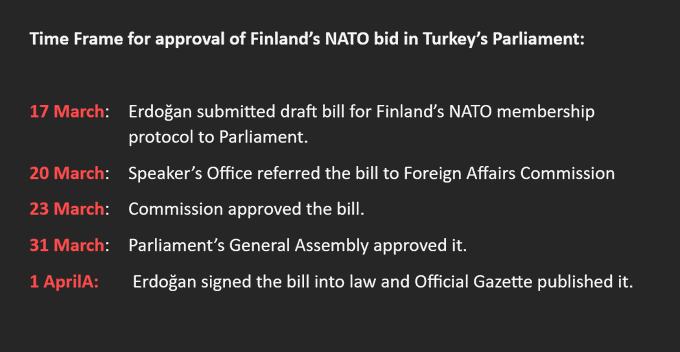
Finland’s application was officially approved by Turkey with Erdogan’s signature and its publication in the Official Gazette on April 1.
Certainly, Ankara’s strategy of separately evaluating Finland and Sweden and approving Finland’s application to demonstrate a constructive and goodwill-oriented approach while highlighting that barriers standing in the way of the approval process originated from Sweden also played a role in the swift approval process.
Facing obstacles from the US Congress regarding the sale of F-16s, Erdogan often responds with a retort, citing the existence of a parliament in Turkey and stating that the decision regarding Sweden will be made by the members of parliament.
However, in Turkey, the parliament cannot be compared to its counterparts in the US or the European Union as it is to a great extent controlled by the president. It’s highly unlikely that members of the ruling party would cast a vote contrary to Erdogan’s wishes.
The ruling Justice and Development Party (AKP) secured 268 seats in the May 14 elections; its Islamist partner the New Welfare Party gained five seats; and another government partner, the Nationalist Movement Party (MHP). garnered 50 seats. Collectively, in the 600-seat parliament, the ruling alliance secured a majority of 323 seats.
Rejecting Sweden’s NATO membership in parliament could lead to a new crisis between Turkey and the US, and this may not be preferred by Erdogan, especially given the economic challenges and his efforts to prevent the Turkish lira from losing more value against the dollar. Considering his re-election in May, he appears to be pursuing more rational policies rather than the anti-Western discourse from the election campaign.
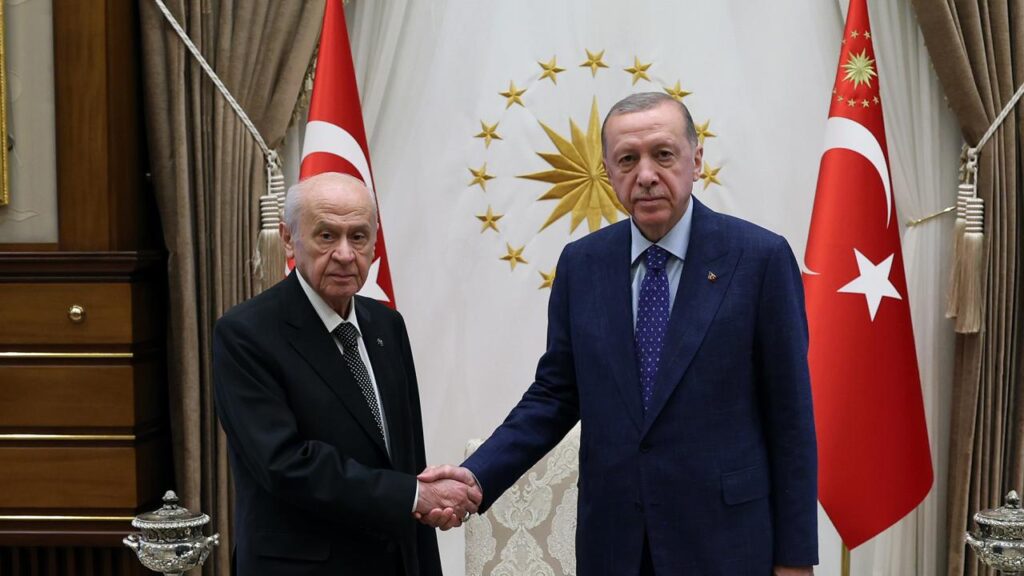
However, the Turkish media is speculating that Erdogan’s coalition partners might vote against Sweden’s NATO application. Devlet Bahçeli, the head of government partner MHP, had used strong language against Sweden, particularly about Quran burning incidents. Nonetheless, Bahçeli’s indication that the ultimate decision rests with the government and his statement about respecting the president’s choice suggests that the MHP is unlikely to create a problem. It’s not anticipated that MHP members would jeopardize their alignment with the ruling party and forfeit the benefits of being in power for the sake of a country like Sweden, which is not located within Turkey’s immediate vicinity.
However, it’s highly likely that the New Welfare Party, with its five seats, will vote against it. Party leader Fatih Erbakan, after reading an information note conveyed to him by Mikail Yüksel, leader of the Turkey-backed Islamist Nyans Party in Sweden, declared their opposition to Sweden’s NATO membership on April 10. He stated that Sweden supports terrorist organizations and endorses Islamophobic acts, expressing their stance against Sweden’s NATO membership and issuing a clear call for the government to oppose the application.
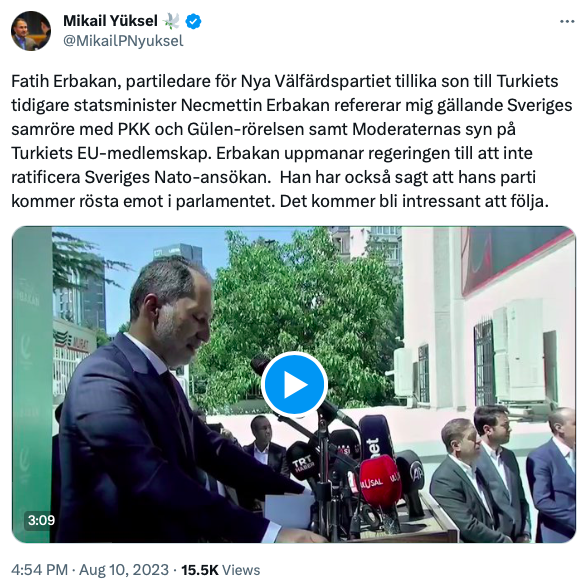
As some observers point out, there are parallels between the current situation and a noteworthy event in 2003, when a proposal was presented to the Turkish Parliament seeking authorization for the deployment of the Turkish Armed Forces abroad and the presence of US forces within Turkey. Despite the appeal of then-prime minister Erdogan, the proposal, which could have allowed the US-led invasion of Iraq from Turkey, was rejected by the parliament. However, a comparison with the current vote on Sweden’s NATO application reveals a distinct contrast. Erdogan’s present dominance over his party, achieved through the elimination of opposition, signifies a shift in dynamics since then.
Additionally, Erdoğan also said on Sunday that the pace of the approval process is contingent on Sweden keeping its promises, indicating that he will negotiate until the last moment.
Referring to the Quran burning incidents in Sweden, he stated, “If these attacks on our sacred values persist, they should not expect apologies.”
However, prior to the July 10-11 NATO summit in Vilnius, Erdogan had expressed similar views, suggesting that the Quran-burning incidents might prevent Sweden from becoming a NATO member. But he gave the green light for Sweden’s membership and announced the start of the approval process following the parliamentary recess.
For those familiar with Turkish politics, it won’t come as a surprise that the Quran burning incidents were never a priority for Erdogan. He saw the NATO negotiations, with Finland and particularly with Sweden, as an opportunity to address some issues with the United States, for instance, securing the procurement of F-16 fighter jets and modernization kits that was denied approval in the US Congress as well as prolonging the ongoing delay of the Halkbank trial, in which a state-owned bank is accused of evading US sanctions on Iran. The Halkbank case also closely concerns the Erdogan family since they are accused of unfairly profiting in the billions of dollars due to the violation of the Iran embargo.
When far-right Danish-Swedish politician Rasmus Paludan burned the Quran outside the Turkish Embassy in Stockholm in January, protests were held in almost every city in Turkey. Islamist groups with support from the government had staged demonstrations in front of the Swedish Consulate in Istanbul and the embassy in Ankara. However, in July, when Quran burnings resumed on a sacred day for Muslims, protests took place across many Muslim countries, while there were no significant demonstrations in Turkey. This absence of a public outcry in Turkey can be seen as an indicator of the government’s control over the masses.
Turkey’s most significant procurement challenge involves acquiring new F-16 fighter jets from the United States to upgrade its outdated fleet.
In 2021 the US administration officially removed Turkey from the F-35 Joint Strike Fighter program due to Ankara’s purchase of a Russian S-400 missile system in 2017.
In February US senators from both the Democratic and Republican parties wrote a letter to President Joe Biden urging him to delay a $20 billion F-16 sale to Turkey until Sweden and Finland’s NATO accession is approved.
A reason for Erdogan’s deliberate pace in responding to Sweden’s application is his desire to not quickly approve Sweden while there is a significant backlash against Sweden in the Islamic world. Last month Turkey approached the member countries of the Organization of Islamic Cooperation, urging stronger and more concrete measures against Sweden and Denmark.
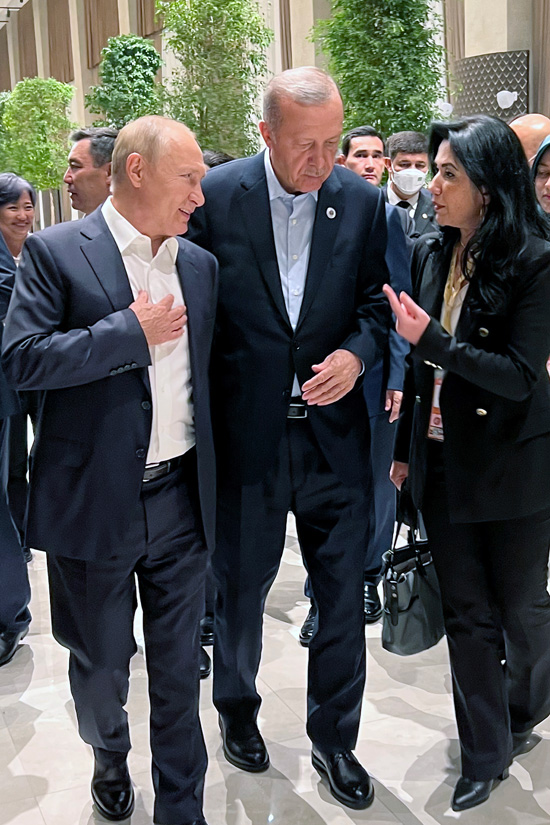
After Erdogan’s re-election in May, he had sent signals of his intention to have a less problematic relationship with the West. The deteriorating economy significantly contributed to this approach. However, there’s apprehension that this situation could harm Turkey’s relations with Russia. Russian President Putin’s continuous postponement of a possible visit to Ankara, the Russian navy stopping a Turkish ship for inspection in the Black Sea last week and the reluctance to extend the grain deal are regarded as messages for Ankara. Nevertheless, Moscow would not expect Turkey, which refused to join Western sanctions and embargoes following the start of the Ukraine war, to do things it is unable to do. Maintaining Turkey in a Trojan horse role in the Western world seems to be a more pragmatic strategy for Moscow.
It is no secret that Erdogan views his negotiations on Sweden’s membership as a ticket to engage in talks with US President Biden during the G-20 meeting in India and at the United Nations General Assembly in New York in September.

